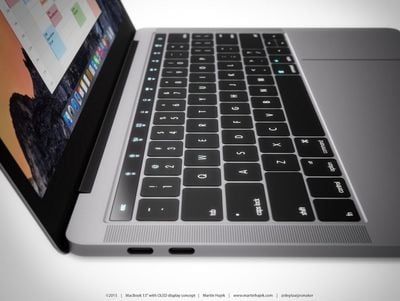macOS Sierra Code Confirms Thunderbolt 3 and 10Gb/s USB 3.1 Transfer Speeds in Future Macs
Code discovered within the macOS Sierra beta suggests the operating system will include support for second-generation USB 3.1 transfer speeds of up 10Gb/s, hinting at hardware upgrades that will be included in future Macs set to be released later this year.
Found in a localizable text string in macOS Sierra by 9to5Mac, the code points to support for "Super Speed Plus," another name for the faster 10Gb/s USB 3.1 Gen 2 specification. Current Macs (and OS X El Capitan) only support current-generation USB 3.1, capable of reaching transfer speeds of up to 5Gb/s, so the obvious conclusion is that Apple is planning to add USB 3.1 Gen 2 support to its upcoming Mac machines.

Apple's new Macs almost always include support for the latest USB and Thunderbolt specifications to maximize performance, so it should come as no surprise that Apple is planning the same upgrades for Macs to be released in 2016. Rumors have also previously suggested Thunderbolt 3, which includes support for 10Gb/s USB 3.1 and DisplayPort 1.2, will be introduced in Apple's most highly anticipated machine due for a refresh, the MacBook Pro, so the code found today is in line with what we'd expect to see.
There is no word on when Apple plans to debut its new MacBook Pro, and if there are other Mac updates in the works, but it is rumored to be debuting before the end of the year, perhaps at an event set to be held in October or November. The machine is said to feature a thinner, redesigned body with an OLED touch panel and Touch ID support.
Popular Stories
iOS 19 will not be available on the iPhone XR, iPhone XS, or the iPhone XS Max, according a private account on social media site X that has accurately provided information on device compatibility in the past.
The iPhone XR, iPhone XS, and iPhone XS Max all have an A12 Bionic chip, so it looks like iOS 19 will discontinue support for that chip. All other iPhones that run iOS 18 are expected...
Apple today released iOS 18.4 and iPadOS 18.4, the fourth major updates to the iOS 18 and iPadOS 18 operating system updates that came out last year. iOS 18.4 and iPadOS 18.4 come two months after Apple released iOS 18.3 and iPadOS 18.3.
Subscribe to the MacRumors YouTube channel for more videos.
The new software can be downloaded on eligible iPhones and iPads over-the-air by going to...
While the iPhone 17 Pro and iPhone 17 Pro Max are not expected to launch until September, there are already plenty of rumors about the devices.
Below, we recap key changes rumored for the iPhone 17 Pro models as of March 2025:
Aluminum frame: iPhone 17 Pro models are rumored to have an aluminum frame, whereas the iPhone 15 Pro and iPhone 16 Pro models have a titanium frame, and the iPhone ...
Apple today released new firmware updates for all AirPods 4 and AirPods Pro 2 models. The new firmware is version 7E93, up from the 7B21 firmware that was installed on the AirPods Pro 2 and the 7B20 firmware available on the AirPods 4 and AirPods 4 with ANC.
It is not immediately clear what new features or changes are included in the new firmware, but we'll update this article should we find ...
Apple's big developer event is a little over two months away, and rumors about what we can expect to see in Apple's next major operating system updates are becoming increasingly frequent.
A public release of iOS 18.4 is also imminent with a number of updates and improvements, although we won't be getting the major Apple Intelligence Siri upgrades that had reportedly been planned for this...
Apple today released macOS Sequoia 15.4, the fourth major update to the macOS Sequoia operating system that launched in September. macOS Sequoia 15.4 comes two months after the launch of macOS Sequoia 15.3.
Mac users can download the macOS Sequoia update through the Software Update section of System Settings. It is available for free on all Macs able to run macOS 15.
With...
Multiple sources have claimed that iOS 19 will introduce a new design with more translucent buttons, menus, notification banners, and more, and there is now another clue that points towards this glass-like appearance.
Bloomberg's Mark Gurman today said the new design project is codenamed "Solarium" internally. A solarium is a room with glass walls that allow in plenty of sunlight, so this...
Apple today released watchOS 11.4, the fourth major update to the operating system that runs on the Apple Watch. watchOS 11.4 is compatible with the Apple Watch Series 6 and later, all Apple Watch Ultra models, and the Apple Watch SE 2.
watchOS 11.4 can be downloaded on a connected iPhone by opening up the Apple Watch app and going to General > Software Update. To install the new software,...























